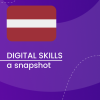Latvian - Education Development Guidelines 2021-2027
The main goal of the Education Development Guidelines 2021-2027 (EDG) is to set Latvia’s priorities in providing a high-quality and inclusive education and training system for all its citizens, and to support sustainable national growth. The Guidelines were approved by the Latvian Government on 22 June 2021.
The EDG covers all levels of education and all types of learning. It is a medium-term policy planning document developed by the Ministry of Education and Science of Latvia that defines the policy objectives, policy actions, timelines, responsible actors, related finances and policy targets for the next seven years for education and skills policies. The Guidelines is being developed in collaboration with relevant ministries and a wide range of stakeholders, such as the Free Trade Union Confederation of Latvia, the Employers’ Confederation of Latvia, the Latvian Chamber of Commerce and Industry, and various other institutions and associations. The main goal of the Education Development Guidelines 2021-2027 is to guide Latvia’s efforts in providing a high-quality and inclusive education and training system for all its citizens, and to support sustainable national growth. The Guidelines covers all levels of education and all types of learning.
The guidelines have been drawn up in the light of:
- the national development strategic objectives and priorities set out in Latvia’s National Development Plan 2021-2027 (NAP2027), Latvia’s 2030 Sustainable Development Strategy and sectoral strategies in the areas of, for example, science, technology and innovation;
- an analysis of the current situation with regard to the main challenges facing Latvian education;
- Latvia is bound by the prevailing educational trends in the Baltic and European region, as well as in the world.
In order to address the challenges identified and to implement the vision for education in 2027, the Guidelines set out four objectives for the development of education:
- highly qualified, competent and excellence-oriented educators and academic staff;
- an up-to-date, high-quality and labour market oriented educational offer;
- supporting everyone’s growth;
- sustainable and efficient management of education systems and resources.
People of all ages and all skill levels should increase their digital skills at different types of educational institutions. To achieve significant gains, educational institutions and employers need to be aware of the opportunities and pro-actively become involved themselves. The objectives to be achieved in education are set in the light of global developments such as the digital transformation, demographic change and changes in the structure of employment.
Skills are vital for enabling individuals and countries to thrive in an increasingly complex, interconnected and rapidly changing world. Countries in which people develop strong skills, learn throughout their lives, and use their skills fully and effectively at work and in society are more productive and innovative and enjoy higher levels of trust, better health outcomes, and a higher quality of life. Skills policies play a central role in paving countries’ development path by, for example, easing the adoption of new technologies and helping firms move up the value-added chain; they also make countries more attractive to foreign direct investment and tend to help foster more tolerant and cohesive societies.
To ensure that countries are able to adapt and thrive in a rapidly changing world, all people need access to opportunities to develop and maintain strong proficiency in a broad set of skills. These skills include cognitive skills, social and emotional skills, job and occupation-specific skills, and digital skills. The process of skills development is lifelong, starting in childhood and youth and continuing throughout adulthood. Skills development occurs not only formally in schools and higher education, but also non-formally and informally in the home, community and workplaces.
Main activities in the field of digital transformation:
- increasing the supply of e-learning in vocational, higher and adult education;
- development of e-learning tools and support materials; development of e-learning platforms;
- development of digital and transversal competences: critical thinking and problem solving, creativity and innovation, self-directed learning, collaboration, civic participation, digital literacy.
Digital skills are considered technical skills, although they entail cognitive ability to enable the understanding, interpretation, analysis and communication of digital content. They are applied in a variety of different occupations and are increasingly pervading the social aspects of everyone’s life.
The EDG is designed to support Latvia’s relevant national and international commitments. Some of the actions in the EDG continue on from the previous EDG 2014-2020, while others are new. The EDG is developed by the Ministry of Education and Science in collaboration with other skills-relevant ministries, such as the Ministry of Welfare and the Ministry of Economics, amongst others, and a wide range of stakeholders, such as trade unions, the Employers’ Confederation of Latvia,the Chamber of Commerce and Industry, and various other institutions and associations.
The OECD has supported Latvia in developing its Education Development Guidelines 2021-2027 through the OECD Skills Strategy Latvia project, which has been conducted in two phases: the Assessment and Recommendations Phase (2018-2019) and the OECD Implementation Guidance Phase (2019-2020).
Strategy Details
Total funding from national, municipal, private sector and European resources — EUR 4 491 661 342
Funding related to digital skills development, ICT and digital resource capacity building activities, namely strengthening the capacity of higher education institutions by changing the career development system of academic staff, strengthening the professional competencies of the academic staff (digital competences, student-centred study processes, etc.) transfer of teaching and learning innovations — EUR 14 137 500;
Advanced digital skills development opportunities in higher education institutions — EUR 26 100 000;
Strengthening the capacity of ICT and digital resources in educational institutions — EUR 27.705,154
Ensure the development of digital education and e-learning solutions in a flexible learning offer - EUR 10 875 000;
Increase investment in the digitalisation of higher education institutions, material-technical base and innovative study and research process — EUR 157,046, 600.
Date of approval: 22 June 2021. Activity plan for 2021-2023 accepted.
EU institutions; Line ministries; Sectoral associations; Sectoral Experts Council; Municipalities and planning regions; Educational institutions; Scientific institutions; Non-governmental organisations; Social partners, etc.




